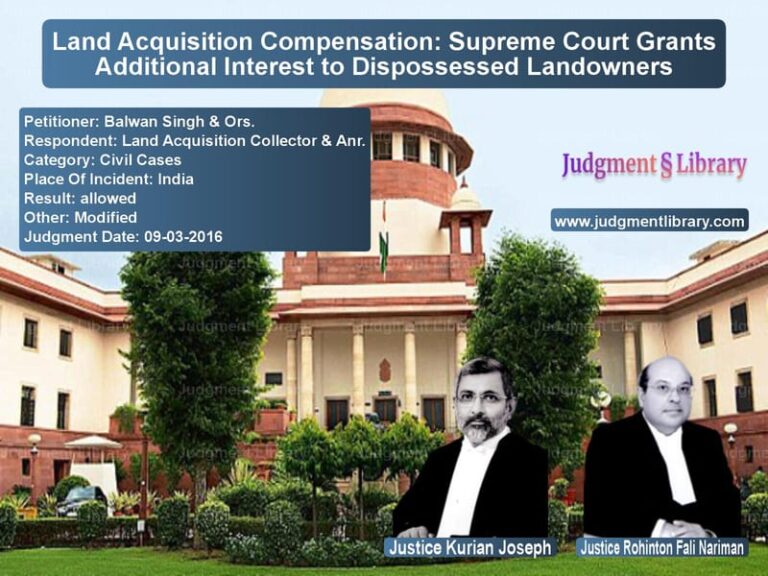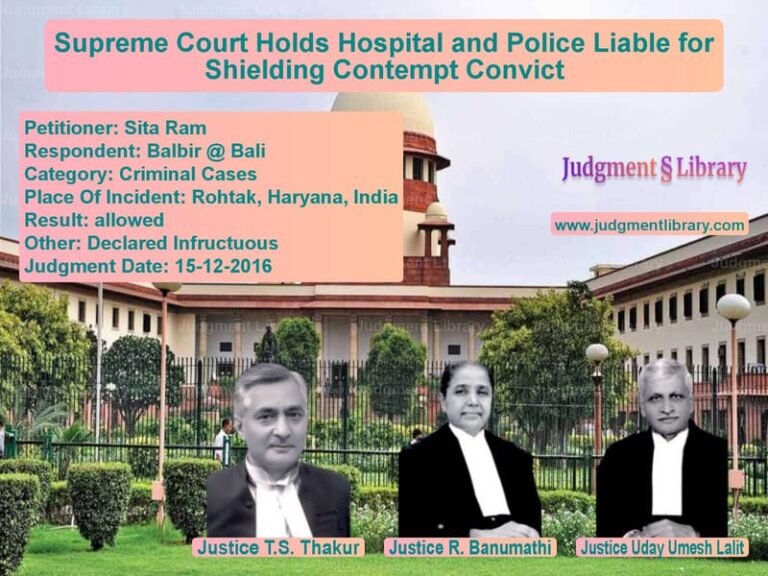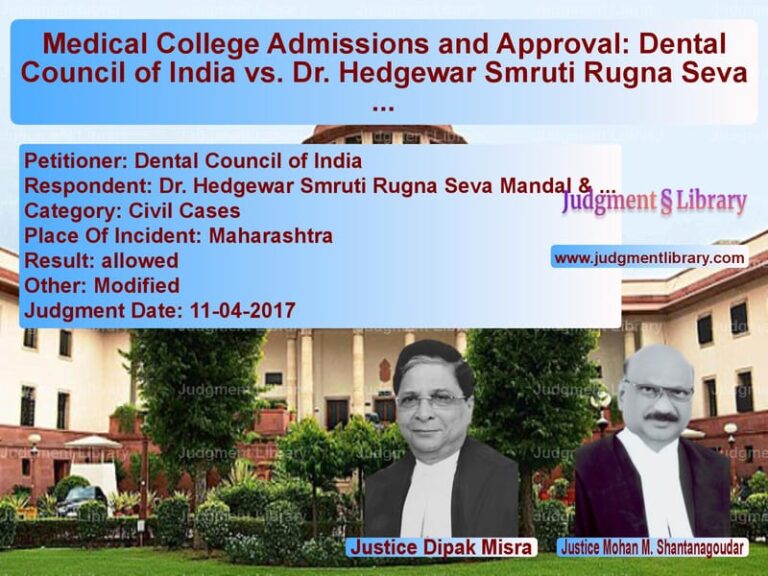Supreme Court Upholds Life Sentence in Karnataka Murder Case: Detailed Legal Analysis
The Supreme Court, in the case of Haalash @ Haleshi @ Kurubara Haleshi v. State of Karnataka, upheld the conviction and life imprisonment of the appellants for murder and related offenses. The Court ruled that the prosecution had successfully established that the accused formed an unlawful assembly with the common intention of eliminating the victim and his family. This judgment reaffirms the application of Section 149 IPC, which holds every member of an unlawful assembly responsible for the crime committed in pursuit of the common object.
Background of the Case
The case originated from a longstanding property dispute between the deceased, Shivanna, and his brother Ramanna (A-9). The dispute resulted in a civil suit that was decided in favor of Shivanna. The execution of the decree led to further conflicts, ultimately escalating into violence.
On September 25, 1999, a group of nine accused, armed with weapons, allegedly attacked Shivanna and his family members at their residence. The prosecution argued that:
- Shivanna was killed by A-1 to A-3 using choppers.
- A-4 and A-5 attacked Shivanna’s wife, Savithramma.
- A-6 and A-7 assaulted Shivanna’s daughter, Girija.
- A-8 and A-9 remained at the door, watching and instigating the attack.
While Shivanna succumbed to his injuries, his wife and daughter survived with grievous injuries.
Trial Court’s Judgment
The prosecution presented:
- 33 witnesses, including the injured eyewitnesses.
- 63 exhibits and 34 material objects.
The Sessions Court found A-1 to A-7 guilty and sentenced them to:
- Life imprisonment under Section 302 IPC read with Section 149 IPC.
- Additional imprisonment for assault under relevant IPC sections.
Accused A-8 and A-9 were acquitted as they were not directly involved in the assault.
High Court’s Decision
The convicted appellants appealed to the Karnataka High Court, which upheld the trial court’s findings, stating:
- There was sufficient evidence that the accused acted in unison.
- Eyewitness testimony from PW-3 (wife) and PW-4 (daughter) was consistent.
- Medical reports corroborated the prosecution’s case.
Arguments Before the Supreme Court
The appellants, A-4, A-5, A-6, and A-7, challenged their conviction on the following grounds:
- Only A-1 to A-3 were directly involved in the killing of Shivanna.
- They were not part of an unlawful assembly under Section 149 IPC.
- Medical evidence was inconsistent with the prosecution’s version.
The State of Karnataka countered, arguing that:
- All accused had assembled with weapons with the common object of attacking Shivanna and his family.
- The injuries suffered by the victims and the sequence of events corroborated the charges.
- The threat made a day before the murder established premeditation.
Supreme Court’s Observations
The Supreme Court bench of Justices Abhay S. Oka and Pankaj Mithal upheld the conviction, making the following key observations:
- “All the accused had assembled at the victim’s house, armed with choppers, and entered the premises together. This shows a clear common object to commit the crime.”
- “The eyewitness testimony of the injured survivors, PW-3 and PW-4, is direct and reliable. Their presence at the crime scene is unquestionable.”
- “Section 149 IPC makes every member of an unlawful assembly liable for the crime committed in pursuance of the common object.”
- “Mere non-participation in the actual killing does not absolve the appellants of liability.”
Final Verdict
The Supreme Court dismissed the appeals and upheld the life sentences. It ruled:
“A plain reading of Section 149 IPC makes it clear that an overt act by some members of an unlawful assembly is sufficient to convict all members for murder.”
The Court directed the appellants to surrender immediately to serve the remainder of their sentences.
Legal Significance of the Judgment
This judgment strengthens the interpretation of Section 149 IPC, reinforcing that:
- All members of an unlawful assembly are accountable for actions committed in pursuit of a common objective.
- Eyewitness testimonies, especially from injured victims, are highly credible.
- Pre-existing disputes and prior threats are crucial in establishing motive.
- Medical discrepancies alone do not override direct evidence.
Implications for Future Cases
This ruling will impact similar cases where multiple accused act collectively. Courts will likely:
- Scrutinize the presence of a common object before invoking Section 149 IPC.
- Place high reliance on injured eyewitnesses’ testimony.
- Reject claims of non-involvement if the accused were actively part of an assembly leading to a crime.
Conclusion
The Supreme Court’s judgment in this case reinforces the principles of collective liability under Section 149 IPC. By upholding the conviction, the Court has sent a clear message that individuals who assemble with a criminal intent will be held accountable, even if they do not directly execute the crime. This case serves as an important precedent in criminal law, emphasizing the need for justice in cases of planned group violence.
Petitioner Name: Haalash @ Haleshi @ Kurubara Haleshi.Respondent Name: State of Karnataka.Judgment By: Justice Abhay S. Oka, Justice Pankaj Mithal.Place Of Incident: Karnataka.Judgment Date: 02-02-2024.
Don’t miss out on the full details! Download the complete judgment in PDF format below and gain valuable insights instantly!
Download Judgment: haalash-@-haleshi-@-vs-state-of-karnataka-supreme-court-of-india-judgment-dated-02-02-2024.pdf
Directly Download Judgment: Directly download this Judgment
See all petitions in Murder Cases
See all petitions in Attempt to Murder Cases
See all petitions in Judgment by Abhay S. Oka
See all petitions in Judgment by Pankaj Mithal
See all petitions in dismissed
See all petitions in supreme court of India judgments February 2024
See all petitions in 2024 judgments
See all posts in Criminal Cases Category
See all allowed petitions in Criminal Cases Category
See all Dismissed petitions in Criminal Cases Category
See all partially allowed petitions in Criminal Cases Category







